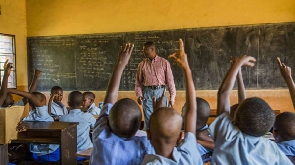 Pupils in class with their teacher
Pupils in class with their teacher
The Bureau of Ghana Languages has criticized the government for doing very little to come up with comprehensive policies and programs that promote Ghanaian indigenous languages.
In a Ghanaian Times newspaper report on Wednesday, February 20, 2023, ahead of International Mother Language Day, commemorated annually on February 21, the Bureau said, government's lack of commitment, coupled with the poor attitude of Ghanaians towards local languages, has deprived the day of its due attention.
The Editor at the Bureau, Mr. Joseph Kofi Avunyra, cited in the article, noted that although Ghana has about seventy-three (73) languages, the current language policy only mandates the study of Ghanaian languages to a limited extent of eleven, as pro-English language policies are still implemented in some schools.
“According to a study conducted by SIL International in 2017, Ghana has about 73 indigenous languages. Out of this number Bureau of Ghana Languages, a government department mandated to write and publish books exclusively in Ghanaian languages, has been operating in eleven Ghanaian languages so far studied in our educational institutions, namely, Akuapem Twi, Asante Twi, Dagaare, Dagbani, Dangme, Ewe, Ga, Gonja, Kasem, Mfantse, and Nzema,” he revealed.
He said, while the situation paints a gloomy picture on the future of Ghanaian indigenous languages, providing education in only one language, not necessarily shared by all learners also has the tendency to impact negatively in learning performance and the development of socio-emotional and foundational literacy skills.
He has therefore called on the government, policymakers, and all other stakeholders to live up to the challenge of taking the necessary steps to promote multilingual education in our schools, with an emphasis on Ghanaian languages.
This year’s International Mother Language Day is on the theme, “Multilingual education – a necessity to transform education.”
Multilingual education enhances the quality of education by underlining the importance of cultural and linguistic diversity. It further increases dialog and interaction among learners, as well as between learners and teachers.
You can also watch this episode of People & Places on GhanaWeb TV below:
PI/OBJ